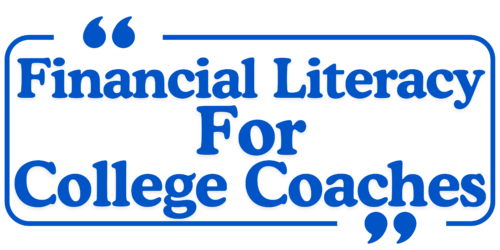Curriculum: Budgeting & Cash Flow Management for College Coaches
This curriculum is designed to help college coaches develop essential skills in budgeting and cash flow management. By understanding how to plan and track their income and expenses, college coaches can gain greater control over their financial well-being and ensure long-term stability. The modules cover everything from the basics of budgeting to more advanced strategies for managing cash flow, especially with the variable nature of coaching contracts.
Module 1: Introduction to Budgeting for College Coaches
Learning Objectives:
- Understand the importance of budgeting and how it impacts financial health.
- Learn how to create a realistic budget based on personal income and expenses.
- Explore how budgeting helps manage fluctuations in coaching contracts.
Topics Covered:
- Why Budgeting is Essential for College Coaches
- Identifying Income Streams: Salary, Bonuses, Incentives, and More
- Creating a Monthly Budget: Fixed vs. Variable Expenses
- Setting Financial Goals Through Budgeting
Module 2: Understanding Income Sources and Tax Implications
Learning Objectives:
- Identify and track all sources of income for college coaches.
- Learn about the tax implications of various income streams, including bonuses and endorsement deals.
- Explore tax-efficient strategies for managing income.
Topics Covered:
- Income Types: Coaching Salaries, Bonuses, and Endorsements
- Tax Withholding and Estimating Quarterly Payments (for bonuses or freelance income)
- Managing Fluctuations in Income: Strategies for Stability
- Using Tax Deductions and Credits to Maximize After-Tax Income
Module 3: Tracking and Managing Expenses
Learning Objectives:
- Develop strategies for tracking and categorizing expenses effectively.
- Understand the difference between essential and discretionary expenses.
- Learn how to minimize unnecessary spending to boost savings.
Topics Covered:
- Categorizing Expenses: Fixed, Variable, and Discretionary
- Essential vs. Non-Essential Spending: How to Prioritize
- Tracking Expenses: Tools and Apps for Financial Organization
- Cutting Costs: Identifying Spending Leaks and Reducing Wasteful Expenses
Module 4: Building an Emergency Fund
Learning Objectives:
- Understand the purpose of an emergency fund and how much to save.
- Learn how to build an emergency fund even with irregular income.
- Explore strategies for maintaining liquidity while building financial security.
Topics Covered:
- Why Every College Coach Needs an Emergency Fund
- How Much to Save: Emergency Fund Target (3–6 months of expenses)
- Strategies for Building an Emergency Fund with Fluctuating Income
- Where to Keep Emergency Savings: High-Yield Savings vs. Investment Accounts
Module 5: Cash Flow Management and Income Fluctuations
Learning Objectives:
- Learn how to manage cash flow when income varies throughout the year.
- Explore strategies for balancing peak income periods (e.g., coaching bonuses) with lean months.
- Use cash flow planning to reduce financial stress during off-seasons.
Topics Covered:
- Handling Income Variability: A Key Issue for Coaches
- Balancing Peak and Low-Income Periods: Cash Flow Strategies
- Creating a Buffer for Lean Months: Preemptive Saving
- Leveraging Multiple Income Streams: Freelance, Consulting, or Side Income
Module 6: Managing Debt and Credit
Learning Objectives:
- Understand different types of debt and how to manage them responsibly.
- Learn strategies for paying down debt while balancing other financial priorities.
- Explore the role of credit scores and how to maintain a healthy credit profile.
Topics Covered:
- Types of Debt: Good vs. Bad Debt
- Strategies for Paying Down High-Interest Debt: Snowball and Avalanche Methods
- Managing Debt Without Sacrificing Savings
- Building and Maintaining a Strong Credit Score
Module 7: Saving for Short-Term and Long-Term Goals
Learning Objectives:
- Learn how to prioritize savings for both short-term goals (vacations, home improvement) and long-term goals (retirement).
- Explore different savings vehicles and investment options based on time horizons.
- Create a saving strategy that aligns with personal and professional goals.
Topics Covered:
- Identifying Financial Goals: Short-Term vs. Long-Term
- Savings Vehicles: Traditional Savings, Money Market Accounts, and CDs
- Balancing Saving for Short-Term Needs and Long-Term Security
- Using Automations to Ensure Regular Savings Contributions
Module 8: Developing a Spending Plan During Off-Seasons
Learning Objectives:
- Learn how to plan for off-season months with reduced income.
- Explore methods for creating spending plans that balance needs and wants.
- Develop strategies for maintaining financial stability when income is lower.
Topics Covered:
- Planning for Off-Season: Anticipating Low-Income Months
- Adjusting Your Budget to Accommodate Reduced Income
- Temporarily Reducing Discretionary Spending
- Using Savings to Supplement Off-Season Expenses
Module 9: Long-Term Financial Planning and Investments
Learning Objectives:
- Understand how to build wealth over the long term through disciplined savings and investing.
- Learn about investment strategies suitable for college coaches, including retirement plans.
- Explore how to align cash flow management with long-term wealth-building strategies.
Topics Covered:
- Introduction to Investing: Stocks, Bonds, and Mutual Funds
- Long-Term Savings: Retirement Accounts, Real Estate, and Passive Income
- Balancing Cash Flow and Investment Contributions
- Tax-Efficient Investing and Wealth Preservation Strategies
Module 10: Review and Financial Check-Up
Learning Objectives:
- Review the key concepts learned throughout the course and perform a personal financial check-up.
- Learn how to adjust budgets and cash flow plans as circumstances change.
- Prepare for ongoing financial success with regular financial reviews.
Topics Covered:
- Conducting a Personal Financial Check-Up
- Adapting Your Budget and Cash Flow Plan as Needs Change
- Planning for the Future: Updating Financial Goals Annually
- Working with Financial Advisors for Continuous Improvement
Conclusion and Certification
Final Assessment: Participants will create a comprehensive budgeting and cash flow management plan tailored to their unique coaching career, personal life, and financial goals.
Certification:
Upon successful completion, participants will receive a certification in Budgeting & Cash Flow Management for College Coaches, demonstrating their ability to effectively manage their finances for both short- and long-term success.
This curriculum ensures that college coaches have the tools and knowledge to effectively manage their cash flow and budget for personal and professional financial success, even with fluctuating income from coaching contracts.
